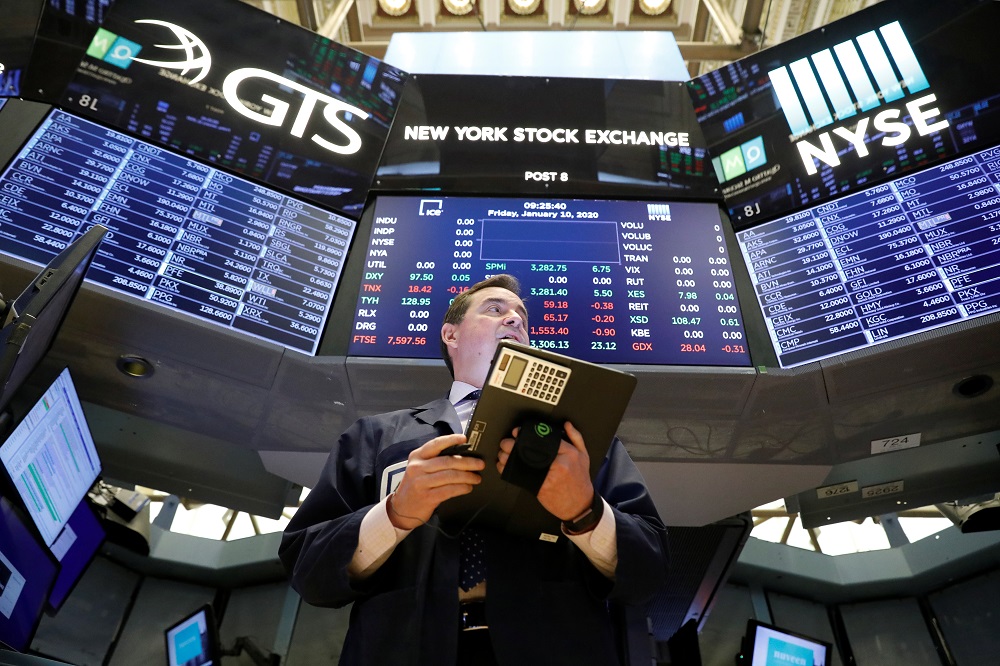NEW YORK, Aug 11 ― Stocks across the globe were little changed yesterday as upbeat industrial data out of China and hopes for more stimulus in the United States were offset by jitters over tensions between Washington and Beijing.
Technology stocks fell after a run of recent gains, while crude oil prices jumped.
Industrial output in China is returning to levels recorded before the coronavirus pandemic halted huge swathes of the economy, driven by pent-up demand, government stimulus and surprisingly resilient exports.
On Wall Street, the Dow industrials touched a more than five-month high but the Nasdaq fell as much as 1.5 per cent, after hitting a record high last week.
Tension between the United States and China ahead of scheduled trade talks at the weekend to review an agreement signed in January was blamed for the lack of market direction.
Talks in Washington over a US fiscal stimulus package for pandemic-stricken businesses and workers caused further investor uncertainty. House Speaker Nancy Pelosi and Treasury Secretary Steven Mnuchin on Sunday said they were open to resuming negotiations.
President Donald Trump has sought to take matters into his own hands by signing executive orders and memorandums aimed, among other things, at continuing unemployment benefits. The figure he put forward is less than the benefit passed earlier in the health crisis, however.
The Dow Jones Industrial Average rose 357.96 points, or 1.3 per cent, to 27,791.44, the S&P 500 gained 9.19 points, or 0.27 per cent, to 3,360.47 and the Nasdaq Composite dropped 42.63 points, or 0.39 per cent, to 10,968.36.
“Part of the reason the S&P 500 has been held back is we're starting to see yet another rotation to value and away from growth,” said Paul Nolte, portfolio manager at Kingsview Investment Management in Chicago. “That tends to hold back the S&P because it's so dominated by big tech.”
The pan-European STOXX 600 index rose 0.30 per cent and MSCI's gauge of stocks across the globe gained 0.15 per cent.
Emerging market stocks lost 0.26 per cent. MSCI's broadest index of Asia-Pacific shares outside Japan closed 0.08 per cent lower, while Japan's Nikkei lost 0.39 per cent.
Oil rose, supported by the Chinese factory data, rising energy demand and hopes for an agreement in the United States on more coronavirus-related economic stimulus.
“The oil complex is heavily reliant on that aid. We need people to be able to boost economic activity to spur demand,” said John Kilduff, partner at Again Capital in New York.
US crude recently rose 2.06 per cent to US$42.07 (RM176.52) per barrel and Brent was at US$45.01, up 1.37 per cent on the day.
Brent settled at US$44.99 a barrel and WTI at US$41.94.
The greenback ticked up against a basket of peers after posting its seventh consecutive weekly loss on Friday. Traders focused on the fiscal stimulus in the United States and US-China tensions.
But the backdrop continued to be bearish for the dollar.
“We think the fundamental backdrop that has provided support for the US dollar in the past two years is turning more adverse,” said in a note Shaun Osborne, chief FX strategist at Scotiabank in Toronto.
The dollar index rose 0.181 per cent, with the euro down 0.38 per cent to US$1.1741.
The Japanese yen weakened 0.01 per cent versus the greenback at 105.95 per dollar, while Sterling was last trading at US$1.3074, up 0.18 per cent on the day.
“The longer-term outlook continues to be great on the euro, so you'll probably see people buying on dips,” said Ed Moya, senior market analyst at OANDA in New York.
Treasury yields ticked higher but remained close to recent lows.
“There is a growing recognition that the recovery has stalled,” said Jon Hill, an interest rate strategist at BMO Capital Markets in New York. “The question is, is that stall going to turn into more of a pause, or a more ominous retrenchment?”
Five-year yields last week fell to their lowest on record and benchmark 10-year yields dipped to their lowest since March as concerns about growth increased demand for the safe-haven debt.
Treasury will this week sell record amounts of 3-, 10- and 30-year debt.
Benchmark 10-year notes last fell 5/32 in price to yield 0.5788 per cent, from 0.562 per cent late on Friday.
The 30-year bond last fell 21/32 in price to yield 1.2544 per cent, from 1.229 per cent.
Spot gold dropped 0.4 per cent to US$2,025.58 an ounce.
Trump has signed executive orders banning Chinese social media platforms WeChat ― owned by Chinese tech giant Tencent ― and TikTok starting next month, and imposed sanctions on 11 Hong Kong and Chinese officials. ― Reuters






















